Exogenous ketones (also called ketone esters) are supplements that contain the metabolized form of fat your body relies on when it’s in a state of ketosis.
Usually, the only way to achieve high levels of ketones in your blood is to either fast or to eat a diet extremely low in carbohydrates.
Exogenous ketones, because they come from outside of your body, allow you to create a state of ketosis even when your diet doesn’t support it.
Ketone supplements can act as weight loss supplements because of the fat loss involved in the state of ketosis. They’re quite popular among ketogenic dieters when they need to “cheat” their diet with a meal that’s high in carbohydrates or protein, but there is also some evidence that ketone esters can be helpful for athletic performance, even in the absence of a ketogenic diet.
If you need a way to maintain ketosis during periods where it’s difficult to stick to a keto diet, or if you are looking for an extra boost to your endurance performance during long, continuous efforts, our researchers have ranked the ten best exogenous ester supplements that will keep your body burning fat for fuel and maintaining a steady and reliable energy source.
Research
Rankings
1. Zhou Keto Drive
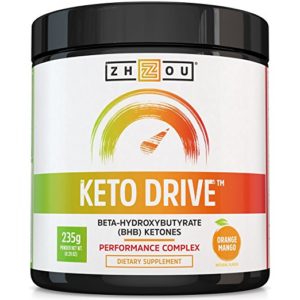
Zhou Keto Drive provides a shot of vitamin A alongside three salt forms of ketone esters: calcium, sodium, and magnesium beta-hydroxybutyrate.
These salt forms of ketone don’t have quite the harsh taste as liquid ketone esters do, which makes it a far better option if you can’t stomach a liquid supplement.
Since it’s sweetened with a little stevia and citric acid, this ketone ester supplement goes down much easier.
2. KetoSports KetoForce
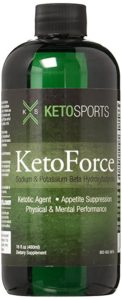
KetoSports KetoForce is a liquid-based ketone supplement, but it’s still based on ketone ester salts—they are just dissolved in the solution.
This makes it easy to mix into a shake or a smoothie, and the fact that this supplement only uses potassium as a salt ion makes it advantageous for people trying to watch their sodium.
The taste is not the greatest, but if you can stomach it, it’s a highly effective ketone ester source.
3. Perfect Keto Base
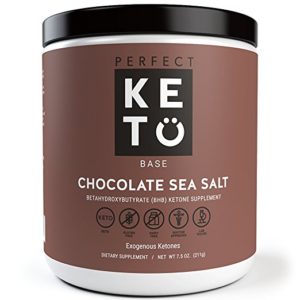
Perfect Keto makes a powder-based ketone supplement that’s flavored with stevia and natural chocolate flavor.
It goes the job done, but as a result of using sodium salts of beta-hydroxybutyrate, its sodium content is pretty hefty. This could prove to be an issue if you are trying to keep your salt intake low to control your blood pressure. That aside, it’s a great product.
4. Vitamonk Ketosene
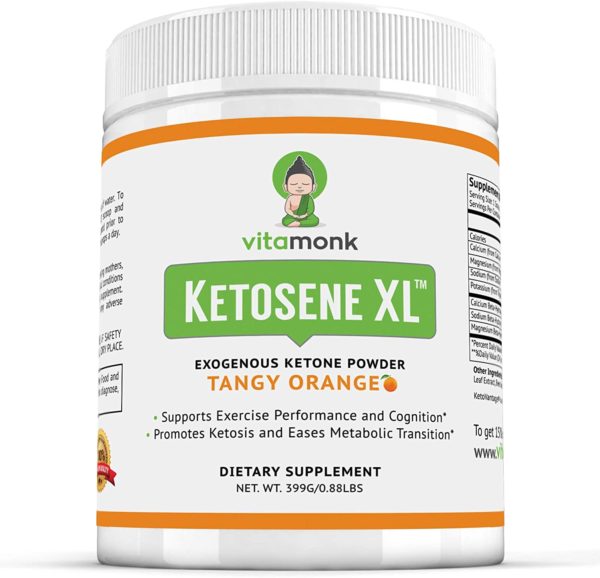
Vitamonk Ketosene is a simple and clean source of ketone esters that uses a balanced array of ketone ester salts alongside stevia and some natural flavoring to spice up the typically-foul ketone ester taste.
It’s a mainstay for keto fans who aren’t looking for anything fancy, and is deserving of a look if that sounds like what you need.
5. Zenwise Health Keto-Lift BHB
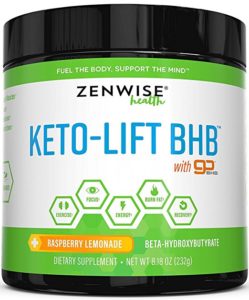
Zenwise Health, like many other ketone ester sources, uses a blend of calcium, magnesium, and sodium salts to deliver ketone fuel, but it keeps the sodium content on the low side.
It’s a good choice if you want lower sodium but the advantages of multiple different ketone ester salts.
6. Nutricost Exogenous Ketone Salts
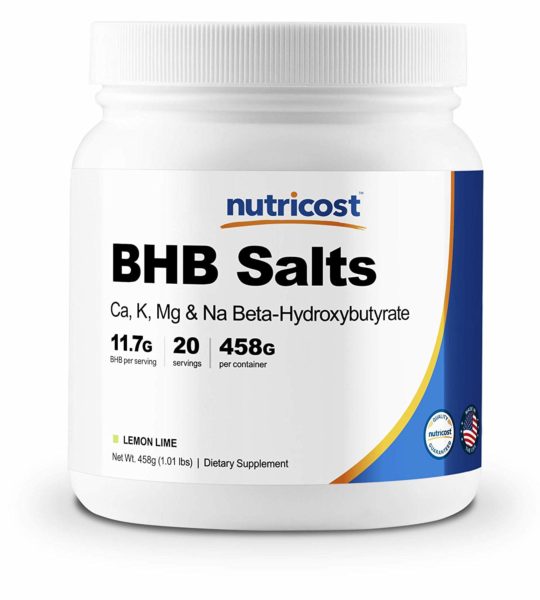
Nutricost Exogenous Ketone Salts have a nice blend of calcium, potassium, magneisum, and sodium based ketone salts, without overloading on the sodium content. However, there’s a bit more binders, fillers, and anti-caking agents in this product than some of the very top exogenous ketone supplements.
7. Giant Keto Exogenous Ketones
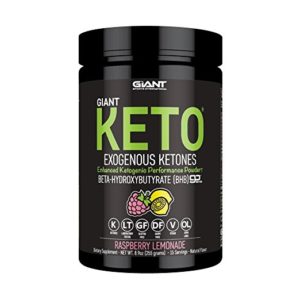
Giant Keto is more than just an exogenous ketone—it’s a comprehensive supplement to help you perform optimally when on a low carb or ketogenic diet.
To this end, it has additional ingredients like selenium, vitamin K, and vitamin D, which you might be lacking if you are on a restrictive diet.
This does mean the ketone ester content is not quite as high, pound for pound, but overall it’ll still be a good choice for some people.
8. KEPPI Keto Chocolate
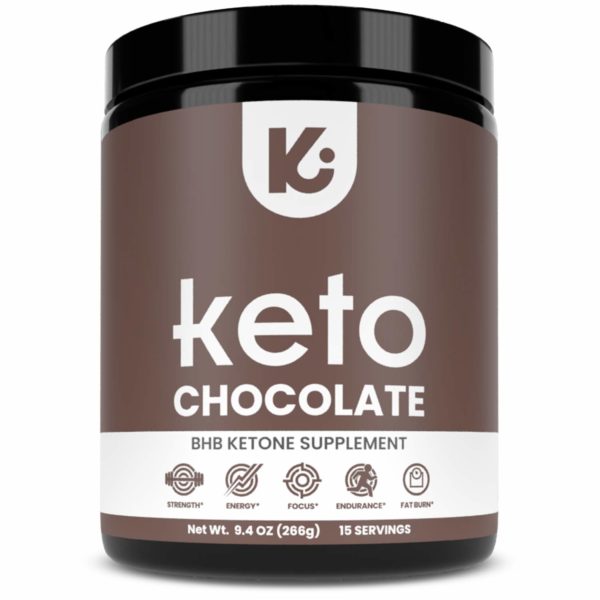
KEPPI makes an exogenous ketone supplement that has a proprietary blend of sodium, magnesium, and calcium BHB salts, along with natural flavor from stevia and monk fruit.
It’s a pretty solid formulation, though the presence of silicon dioxide and 640 mg of sodium makes it not the best choice for people who are dieting.
9. IGNITE KETO BHB Salts
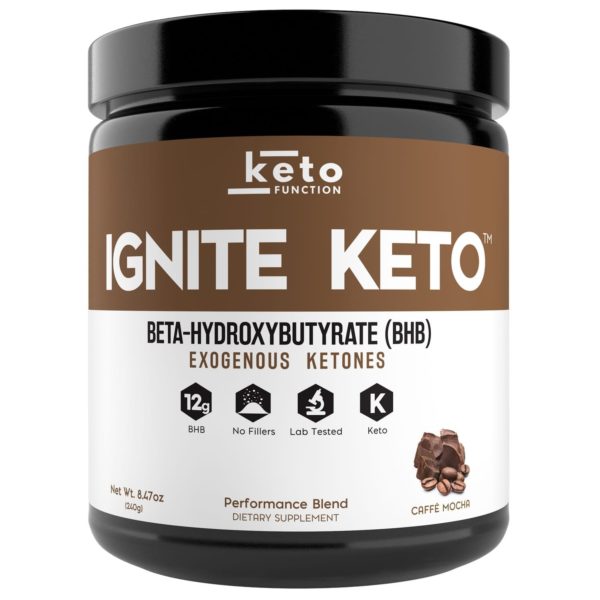
IGNITE KETO BHB Salts use a proprietary blend of ketone salts, along with stevia and monk fruit for flavoring.
The natural flavoring agents are nice, though using a proprietary blend makes it difficult to objectively evaluate the efficacy of the ketone salts.
10. Julian Bakery InstaKetones
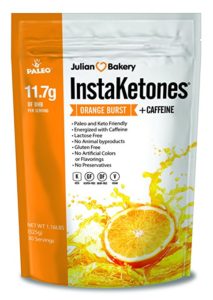
InstaKetones uses a ketone ester salt that’s heavy on calcium and sodium, and is flavored with luo han guo as opposed to the usual stevia.
It’s got taurine for an extra workout boost, but the taste is a real buzzkill and many users find it’s not as effective as they’d like.
Category winners
Best exogenous ketones overall: Zhou Keto Drive
Zhou Keto Drive is our top recommendation thanks to its comprehensive array of ketone salts, low sodium content, and great taste. For a versatile all-purpose exogenous ketone supplement, you can’t go wrong with this choice.
Best exogenous ketones for endurance sports: Zhou Keto Drive
Cyclists, runners, and other endurance athletes can count on Zhou Keto Drive if they’re looking for a keto fuel boost for performance—the all-natural flavoring helps the ketones go down easy, and the powder-form salts are easy to mix up into your hydration system of choice.
Best exogenous ketones for keto diet: Perfect Keto Base
Want to keep your body in ketosis, even after a small “cheat” meal? Perfect Keto Base has you covered. Its high-concentration ketone salts and great taste can help you keep your metabolic momentum, even if your diet isn’t perfectly up to snuff 100% of the time.
Best exogenous ketones for weight loss: Vitamonk Ketosene XL
Vitamonk does a great job of keeping the sodium content of their exogenous ketones low, and with stevia and natural flavors, it has a refreshing tanginess that makes the ketones go down easier. It’s great for long periods of lower caloric intake if you’re dieting.
Best exogenous ketones for intermittent fasting: KetoSports KetoForce
For an energy boost during long periods of fasting, go for KetoSports KetoForce. The liquid-form ketone supplement delivers the cleanest and most easily-absorbed exogenous ketones, helping sustain the robust benefits of intermittent fasts.
Best exogenous ketones to take before bed: Zenwise Health Keto-Lift BHB
Do you wake up feeling drained when fasting or when on a keto diet? Zenwise is the perfect before-bed option. Its four different ketone salts can keep your blood ketone levels high, ensuring you sleep well and wake up with plenty of energy.
Who should buy exogenous ketones?
Exogenous ketones are a specialized supplement for a few specific groups of people: people looking to lose weight weight from a low-carb or ketogenic diet, people using intermittent fasting, and endurance athletes looking for a competitive edge.
The actual benefits accrued by each of these groups are different, but all of them are based on the fact that exogenous ketones can raise your body’s levels of blood ketones, without actually being in ketosis.
People on a low carb or ketogenic diet can use exogenous ketones to tide them over if they have to break from their diet for a meal or a snack that’s high in carbs, without completely falling out of ketosis.
Exogenous ketones also have a similar application for people who do intermittent fasting: by taking exogenous ketones, you can stay in a fasted state for a few hours even after breaking your fast with your first meal of the day.
In principle, exogenous ketones could help extend a 16-hour fast to the physiological equivalent of a 19 or 20 hour fast, at least from the perspective of your blood ketone levels.
Finally, cyclists, long distance swimmers, and marathon/ultramarathon runners can take advantage of the extra energy provided by exogenous ketones to improve performance.
In endurance events, the limiting factor for performance is often your body’s ability to produce energy without the accumulation of fatigue-inducing waste products like lactate.
Exogenous ketones appear to offer your body an additional source of energy that can be burned without increasing your fatigue levels. Athletes doing multi-hour events should consider exogenous ketones for this reason.
How we ranked
Our research team started by assembling a list of all of the exogenous ketones supplements available right now. We only focused on those that were primarily or solely focused on delivering ketones.
Some generic weight loss supplements include ketone salts almost as an afterthought; these products were removed from consideration. Next up, we focused on the type of ketone salt used in the product.
Ketone esters are typically in an ionic form, which means they need to be “paired” with something else to make them into a usable supplement. This could be sodium, potassium, magnesium, or calcium, to name some of the most common options.
We had a strong preference for formulations that kept the sodium content low, mostly to help users who are using ketones as part of a health routine to lose weight and decrease their risk factors for cardiovascular disease.
Sodium is a well-known contributing factor to your blood pressure: diets that are lower in sodium are highly effective ways to reduce blood pressure (1).
Thus, if you’re doing the keto diet, a lower carb diet, or intermittent fasting to decrease the risk of cardiovascular disease, the last thing you need is a supplement that’s going to jack up your sodium intake (and therefore your blood pressure).
Along these lines, we had a strong preference for exogenous ketone supplements that used non-sodium salts of ketones. If you are an athlete, and you’re only using exogenous ketones sparingly, it’s not such a big deal that your supplement has a lot of sodium in it.
Exogenous ketones are also infamously foul-tasting. To combat this problem, our team looked for exogenous ketone supplements that effectively used natural sources of flavoring and sweetness to cover up the ammonia-like flavor of raw exogenous ketones.
However, we eliminated products that used sugar to sweeten their exogenous ketones (since that would defeat the purpose of striving to stay in ketosis), and we had a strong preference for supplements that used natural flavors and sweeteners like stevia, as opposed to artificial sweeteners and flavoring agents.
Finally, we evaluated whether the remaining exogenous ketone supplements offered any additional perks, like including vitamins or minerals that are useful for people on low carb or ketogenic diets.
Some nutrients, like vitamin D, selenium, and vitamin K, can be tricky to get in sufficient amounts while on a restricted diet. These weren’t huge factors in determining the final rankings, since a better solution is just to use a daily multivitamin instead. After applying these criteria, we were left with our final rankings of the top exogenous ketones on the market.
Benefits
Exogenous ketones are great for keto diets, low carb diets, and endurance performance. Exogenous ester supplements have two primary uses: first, as a way to keep your body in a state of ketosis even if you have to “cheat” a bit on some of your meals from time to time, and second, as a way to leverage ketogenic energy pathways for better athletic and cognitive performance, even if you are not on a ketogenic diet.
While the health benefits of a keto diet are widely reported, the potential performance advantages of ketone esters outside of the usual ketogenic diet routine are less well-known.
Your blood levels of ketone are the best indicator of your ketogenic status. While monitoring urine levels of ketones is the most popular and practical method of assessing ketogenic status, it’s not the best predictor of how effective your ketogenic diet (or supplement) actually is.
Research on ketogenic diets in epileptic children has found that the best predictor of success on the diet is not urinary ketone levels, but blood levels of beta-hydroxybutyrate (2).
For this reason, if you need to boost your ketosis state, the easiest way to achieve this in short order is to increase your beta-hydroxybutyrate content. One way to do this is restricting your diet even more, but simply taking a ketone ester is a lot faster.
Exogenous ketones could protect your brain from neurodegenerative diseases. As many people know, the ketogenic diet was first developed to treat intractable epilepsy in children.
Even today, the reasons why it works so well are shrouded in mystery, but given that it does work, there’s incontrovertible evidence that ketones have a profound effect on your brain function.
Emerging scientific evidence suggest that the ketone esters that your body uses for fuel during ketosis could protect your brain from chronic neurodegenerative diseases like Alzheimer’s.
One study, published in 2005 in the journal Nutrition & Metabolism, used lab mice to study how a state of ketosis (characterized by high levels of beta-hydroxybutyrate—aka ketone ester—in the blood) affected the buildup of damaging plaques (3).
In the paper, the researchers described their experiment: two groups of mice bred with a specific genetic trait to predispose them to the mouse equivalent of Alzheimer’s disease were fed either a high carbohydrate and low fat diet (the usual procedure for lab mice), or a strongly ketogenic diet high in fat and very low in carbohydrates.
After 43 days, the researchers dissected the brains of the mice to test them for levels of beta amyloid, a plaque protein closely linked to brain tissue degeneration.
They found that the mice in a state of ketosis had 25% less beta amyloid buildup compared to the mice on the standard diet, and the main discriminating factor between the group was the level of ketone esters in their blood. This suggests that, in addition to short-term cognitive benefits, ketone esters could protect your brain in the long run.
Exogenous ketones can keep you in a state of ketosis even when you aren’t on a ketogenic diet. Given the extreme difficulty of adhering to a true ketogenic diet, it would be advantageous if you could get the same benefits without the highly restrictive macronutrient requirements. Fortunately, a ketone ester supplement appears to offer this possibility.
A large and comprehensive scientific study published by researchers at the University of Oxford in the UK demonstrated that either a liquid form ketone ester or a ketone salt, when taken in an adequate dosage, could maintain similar blood levels of ketones as are found in a ketogenic state, even when preceded by consuming a traditional meal that does not follow ketogenic diet requirements (4).
To actually accomplish this long-term, it takes fairly regular ingestion of ketone ester, as each dose only raises blood levels of beta-hydroxybutyrate for about three to four hours.
Hence, this is why ketone esters are more popular as a way to “cheat” on a ketogenic diet versus a stand-alone solution.
Exogenous ketones can improve endurance exercise performance, even on a normal diet. While a ketogenic diet has been toyed with by some ultra-endurance athletes, it doesn’t appeal to many high-intensity sport athletes because it requires severely curtailing your intake of carbohydrates, the primary fuel for short, intense exercise.
However, recent research suggests that a ketone ester supplement could boost your exercise performance by inducing ketogenic-like metabolic effects, even when you are on a regular diet.
A series of studies described in the journal Cell Metabolism in 2016 detailed the biochemistry behind the use of ketone esters to improve exercise performance (5).
In short, a ketone ester supplement ingested before high intensity aerobic exercise allows you to maintain the same exercise intensity, but with less fatigue accumulation.Even though glycogen is available in the muscles, your body burns ketones instead, sparing energy and postponing fatigue.
Exogenous ketones could prove incredibly valuable to marathoners, cyclists, swimmers, and other endurance athletes when incorporated into their workouts.
Side effects
Exogenous ketones are so new that there are no clinical trials that would be able to detect or report any side effects directly.
The most obvious side effect of any ketone ester supplement is simply its bad taste—ketone esters have a reputation for having a pretty foul taste, especially when they are in their liquid ester form.
Journalists from Business Insider reported gagging and tearing up when they tried one of the latest liquid ketone ester supplement thanks to its pungent taste (6).
The ketogenic diet itself has a few reported side effects, such as rare cardiac complications and selenium deficiency, but it’s not clear whether a ketone ester supplement would cause similar problems when consumed with an otherwise normal diet (7).
Recommended dose
For most people, a ketone ester is most effective at boosting you into a ketogenic state by taking a dose of 12 to 24 grams of beta-hydroxybutyrate, either in liquid ester form or in a salt.
This will raise your blood levels of ketone ester for about three to four hours, after which they will return back to normal.
For most cognitive and physical performance tasks, this should be sufficient, but if you are working through a massive project or competing in an ultraendurance event, you might need a boost halfway through.
FAQ
Q: How long does it take for exogenous ketones to work?
A: Exogenous ketone supplements start working impressively fast. Within half an hour of taking a ketone ester or a ketone salt, your blood levels of ketones are increasing rapidly. By one hour, you’ve reached the peak level of ketones in your blood.
After three hours, ketone levels are already declining, and after around four hours or so, you’re pretty much right back to your baseline level.
That’s why exogenous ketones are such a great quick fix: they can rapidly boost your ketone levels and sustain them for a few hours, though this also means they’re not a long-term solution to keeping your body in a ketogenic state for most or all of the day. To do that, you need to either adopt a ketogenic diet or do intermittent fasting.
Q: Are exogenous ketones good for weight loss?
A: Exogenous ketones are unlikely to produce weight loss on their own, but when incorporated into a careful weight loss plan, they could be able to increase the efficacy of your weight loss plan.
Exogenous ketones pair well with the ketogenic diet, as well as with intermittent fasting. If you follow the keto diet perfectly, you won’t need exogenous ketones, but as anyone who has done keto for more than a few days can tell you, it is very hard to stick to the diet, especially when you are travelling or eating out at restaurants.
Exogenous ketones can help sustain a state of ketosis, even if you have to “cheat” on the diet. With intermittent fasting, exogenous ketones are great because they can effectively boost the duration of high ketone body levels in your body, even after you’ve started your feeding period for the day.
In this way, exogenous ketone supplements pair effectively with the ketogenic diet and with intermittent fasting, which are both effective weight loss strategies for many people.
Q: Is MCT oil a ketone?
A: No, MCT oil is not a ketone. However, when your body processes it, MCT oil can be broken down into ketones, as long as your body is in a ketogenic state (i.e. your carbohydrate intake has been significantly restricted for a long enough period of time, or you’ve been fasting for a long period of time).
Q: Are exogenous ketones good for intermittent fasting?
A: Intermittent fasting is an increasingly popular strategy for weight loss and weight maintenance (as well as cognitive performance and other benefits), and its goals pair well with exogenous ketones.
According to 2016 scientific review in the journal Aging Research Reviews, intermittent fasting has two major benefits (8).
First, intermittent fasting exposes your body to fewer major spikes in blood glucose, and second, it leads to a rise in ketone bodies in your blood during the day (late in your fast, before you break it).
Though this strategy has yet to be rigorously studied in detail, there’s good theoretical support for using exogenous ketones before your first meal to increase the duration that you have high levels of ketone bodies in your blood.
Since exogenous ketones can boost your ketone body levels for three to four hours, a reasonable plan of attack is to take an exogenous ketone supplement about 15 to 20 minutes before your first meal of the day.
This should help give you an additional three or four hours of effective fasting, at least from a ketone bodies point of view.
Q: Should you take exogenous ketones before bed?
A: Taking exogenous ketones before bed doesn’t make much sense, because you’re already about to start fasting. When you wake up in the morning, you’ve been fasting for a long period already, and your blood ketone levels will be rising.
It actually makes more sense to take exogenous ketones in the morning, since (if you don’t skip breakfast) you’re about to break your fast and drop your blood ketone levels down again.
One exception might be if you’ve been snacking before bed and want to prevent the decrease in ketone bodies that results from your pre-bed snack.
Q: Are exogenous ketones dangerous?
A: Exogenous ketone supplements are very new; their side effect profile is not well-studied, so it’s hard to characterize their risk level.
They’ve been successfully used without significant adverse effects in scientific research, though, so that is at least a promising sign. They do carry some risk of causing an upset stomach, as they tend to have a pretty strong taste, though this is effectively masked by natural flavoring and sweetening agents in the better exogenous ketone supplements.
A potential longer-term risk could be increased blood pressure if the exogenous ketone supplement you are using has sodium-based ketone salts: a high sodium diet is known to increase blood pressure.
To avoid this, use an exogenous ketone supplement that uses potassium, magnesium, or calcium as its primary salts instead.
Q: What are exogenous ketones?
A: Exogenous ketones are supplements that contain some of the end-products of fat metabolism. In traditional ketogenic dieting, your body is starved of carbohydrates and sugars, so it is forced to start burning fat for fuel via the production of ketones.
Ketones are the product of direct fat metabolism, which is why you can check for ketosis by measuring ketone levels in your urine or in your blood. Normally, it takes long bouts of fasting to create high levels of ketone bodies in your blood.
However, it turns out that by taking a supplement that provides these ketone products directly, you can rapidly boost your blood ketone levels, even if you aren’t actually on a keto diet or doing a fast.
These are called “exogenous” ketones because they come from outside your body, as opposed to the endogenous ketones that your body produces when you are fasting or on a ketogenic diet.
Q: How do you use exogenous ketones?
A: Exogenous ketones are pretty easy to use since they take effect so rapidly. To use an exogenous ketone supplement, mix a carefully measured dose of the supplement powder with water (or your favorite keto shake) and drink it.
Ketone levels in your blood will start rising remarkably quickly, and should reach maximum levels in an hour or less. Because of the rapidity with which exogenous ketone supplements take effect, you should take them within half an hour or so of when you need them.
Usually, that means around a “cheat” meal if you are doing keto, or your first meal of the day if you are doing intermittent fasting. Athletes should take exogenous ketone supplements within half an hour of starting their event.
If the event is going to last for four hours or longer, you’ll want a second dose of exogenous ketones at about the three-hour mark.
Q: How long do exogenous ketones stay in your blood?
A: Exogenous ketones, either in a liquid form or in a salt form, can keep your blood ketone levels similar to what they’d be if you were in a state of ketosis, but only for about three to four hours.
That’s according to research published recently in the journal Frontiers in Physiology, which took an explicit look at ketone metabolism inside the human body (9).
There’s an easy interpretation of these results: exogenous ketones are great for short-term performance or for a short-term boost in blood ketone levels, but you’d have to take them several times per day to keep your blood levels of ketones as high as they would be if you were in permanent ketosis. In this way, they’re a short-term solution as opposed to a long-term solution.
Related articles
Recap
Exogenous ketones are supplements that offer the promise of extending the benefits of a ketogenic diet beyond the usual highly restrictive requirements of very high fat intake and very low carb intake.
If you are trying to stay in a state of ketosis, a ketone ester supplement can keep you there even if you have to cheat for a meal or two.
Ketone ester intake on a regular basis might not only improve cognitive performance, but have a neuroprotective effect, staving off degeneration of your brain tissue.
Most interestingly, ketone esters appear to improve endurance exercise performance, without the requirement of actually adopting a ketogenic diet.
There’s sure to be more research on ketone ester supplements in the coming years, but they already show a lot of promise when it comes to advancing the benefits of ketosis beyond the ketogenic diet itself.
For BodyNutrition‘s #1 exogenous ketone recommendation, click here.